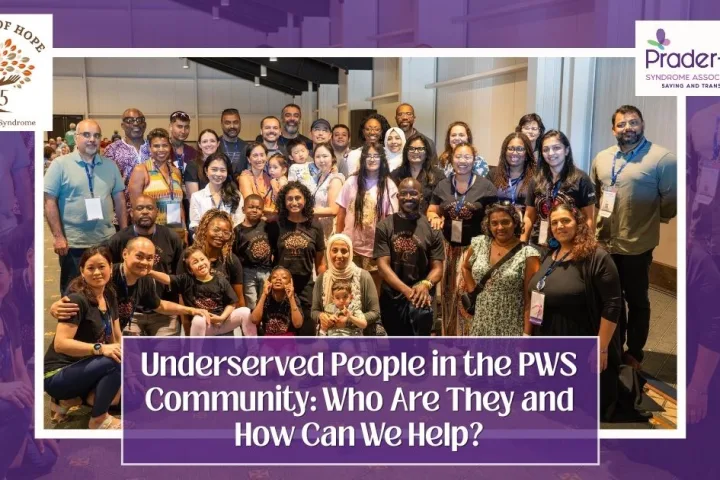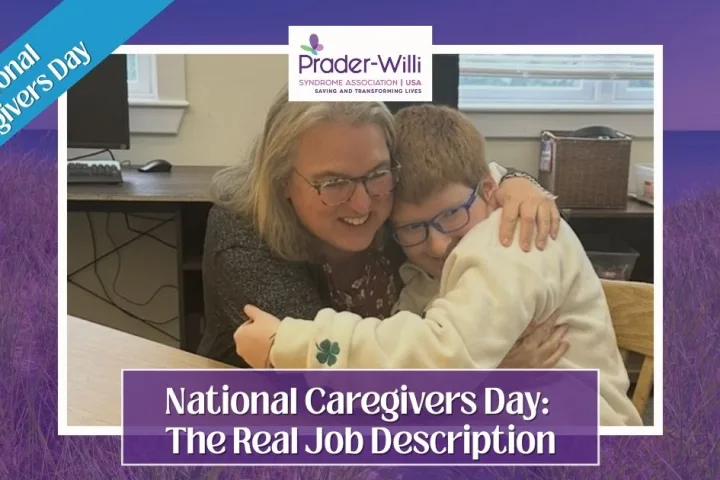contributed by Mallory Servais
If you’re reading this, I’m guessing you have a sibling with Prader-Willi Syndrome (PWS), which means you probably get what it’s like to live in a house where your rules revolve around food. And if you have a sibling like mine, emotions can go from zero to one hundred in seconds.
I get it, because I live it too.
Having a sibling with PWS can be a lot. Having a sibling with PWS is a rollercoaster. So if you’ve ever felt frustrated or just really tired of hearing about food schedules, same. And if you’ve ever caught yourself thinking, Why is everything about them, you’re not alone. I’ve been there. When I see my mom and dad take care of my sister, I sometimes feel guilty for even thinking about these things.
But here’s the thing: Your feelings matter, too. Even when it feels like everything is about your sibling, I promise you are not alone.
Parts That Are Hard
Rules about food. My sister is constantly thinking about food. It’s locked up. Meals and snacks are scheduled at specific times. People don’t always get why our family does things differently, and sometimes, I have a hard time explaining it.
People don’t always get it. We’ve had friends and family ask, “Why can’t you just tell your sister no?” It doesn’t work that way!
My sister has meltdowns. If things go differently than my sister expects them to (especially with food), she may have a meltdown. I know it’s because of PWS, but sometimes I get frustrated.
Feeling guilty or annoyed is ok. Sometimes I get annoyed when my sister needs extra attention.
If you can relate to any of this, you’re not a bad person for feeling this way. You’re just human.
The Unexpected Silver Lining
Sometimes it’s hard to see the positives. But having a sibling with PWS has taught me a few things I might not have learned otherwise:
I feel like I can handle stress really well. I accept people’s differences and I can stand up for them. I have more patience. I appreciate little things (like going out to eat!). I learned that humor can be good when dealing with difficult things.
And what I really know for sure? I know that my sister loves me no matter what. And although she may not always show it, I know my sister will always love me for who I am.
Share this!





 Perry A. Zirkel has written more than 1,500 publications on various aspects of school law, with an emphasis on legal issues in special education. He writes a regular column for NAESP’s Principal magazine and NASP’s Communiqué newsletter, and he did so previously for Phi Delta Kappan and Teaching Exceptional Children.
Perry A. Zirkel has written more than 1,500 publications on various aspects of school law, with an emphasis on legal issues in special education. He writes a regular column for NAESP’s Principal magazine and NASP’s Communiqué newsletter, and he did so previously for Phi Delta Kappan and Teaching Exceptional Children. Jennifer Bolander has been serving as a Special Education Specialist for PWSA (USA) since October of 2015. She is a graduate of John Carroll University and lives in Ohio with her husband Brad and daughters Kate (17), and Sophia (13) who was born with PWS.
Jennifer Bolander has been serving as a Special Education Specialist for PWSA (USA) since October of 2015. She is a graduate of John Carroll University and lives in Ohio with her husband Brad and daughters Kate (17), and Sophia (13) who was born with PWS. Dr. Amy McTighe is the PWS Program Manager and Inpatient Teacher at the Center for Prader-Willi Syndrome at the Children’s Institute of Pittsburgh. She graduated from Duquesne University receiving her Bachelor’s and Master’s degree in Education with a focus on elementary education, special education, and language arts.
Dr. Amy McTighe is the PWS Program Manager and Inpatient Teacher at the Center for Prader-Willi Syndrome at the Children’s Institute of Pittsburgh. She graduated from Duquesne University receiving her Bachelor’s and Master’s degree in Education with a focus on elementary education, special education, and language arts. Evan has worked with the Prader-Willi Syndrome Association (USA) since 2007 primarily as a Crisis Intervention and Family Support Counselor. Evans works with parents and schools to foster strong collaborative relationships and appropriate educational environments for students with PWS.
Evan has worked with the Prader-Willi Syndrome Association (USA) since 2007 primarily as a Crisis Intervention and Family Support Counselor. Evans works with parents and schools to foster strong collaborative relationships and appropriate educational environments for students with PWS. Staci Zimmerman works for Prader-Willi Syndrome Association of Colorado as an Individualized Education Program (IEP) consultant. Staci collaborates with the PWS multi-disciplinary clinic at the Children’s Hospital in Denver supporting families and school districts around the United States with their child’s Individual Educational Plan.
Staci Zimmerman works for Prader-Willi Syndrome Association of Colorado as an Individualized Education Program (IEP) consultant. Staci collaborates with the PWS multi-disciplinary clinic at the Children’s Hospital in Denver supporting families and school districts around the United States with their child’s Individual Educational Plan. Founded in 2001, SDLC is a non-profit legal services organization dedicated to protecting and advancing the legal rights of people with disabilities throughout the South. It partners with the Southern Poverty Law Center, Protection and Advocacy (P&A) programs, Legal Services Corporations (LSC) and disability organizations on major, systemic disability rights issues involving the Individuals with Disabilities Education Act (IDEA), Americans with Disabilities Act (ADA), and the federal Medicaid Act. Recently in November 2014, Jim retired.
Founded in 2001, SDLC is a non-profit legal services organization dedicated to protecting and advancing the legal rights of people with disabilities throughout the South. It partners with the Southern Poverty Law Center, Protection and Advocacy (P&A) programs, Legal Services Corporations (LSC) and disability organizations on major, systemic disability rights issues involving the Individuals with Disabilities Education Act (IDEA), Americans with Disabilities Act (ADA), and the federal Medicaid Act. Recently in November 2014, Jim retired.